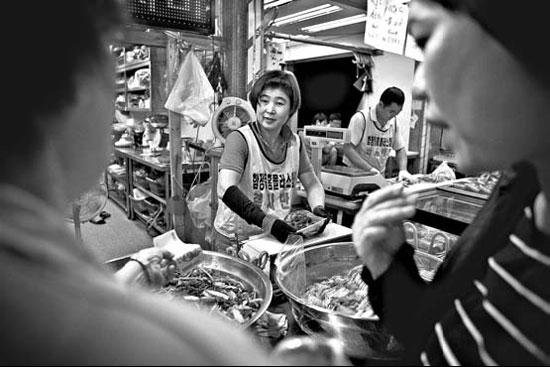Hypermarkets draw ire in South Korea
Updated: 2012-11-11 08:03
By Choe Sang-Hun(The New York Times)
|
|||||||||
|
Store owners along traditional shopping streets say they are being forced out by large department stores, many of them owned by conglomerates. Jean Chung for The International Herald Tribune |
BUPYEONG, South Korea - When sales at his clothing shop began sliding several years ago, In Tae-yeon blamed a bad economy. But he said he soon realized the problem was hypermarkets crowding into commercial districts, attracting shoppers with flashy signs and huge discounts and, as Mr. In put it, "sucking the life out of small-business men like me, like vampires."
The arrival of hypermarkets - vast department stores that also contain supermarkets - is relatively new in South Korea. But the stores are unique in the country because most are owned by chaebol, the family-controlled conglomerates whose dominance in large swaths of the economy is prompting many in South Korea to refer to the country as the Republic of Chaebol.
Rapidly expanding nationwide chains of hypermarkets, supermarkets and 24-hour-a-day convenience stores are the latest and perhaps most visible examples of the penchant among the chaebol for seemingly relentless growth. Total revenue at hypermarkets grew to 33.7 trillion won, or $30.3 billion, in 2010 from 23.7 trillion won in 2005, according to the national statistical agency. During the same period, sales at traditional markets declined to 24 trillion won from 32.7 trillion won, according to other government statistics.
So when owners of small stores, like Mr. In, began pushing back, picketing hypermarkets and lobbying lawmakers, they started a movement in support of what is called "economic democratization."
The chaebol are widely credited with leading South Korea's economic growth, exporting goods as diverse as cellphones, cars and ships. The five biggest chaebol - Samsung, Hyundai Motor, SK, LG and Lotte - generated 653 trillion won, or $57.7 billion, in sales in 2010.
For several years, store owners in the traditional shopping street where Mr. In keeps his shop have suffered declining sales because of competition with three hypermarkets and a department store.
"Currently they are behaving like giant serpents gobbling up everything," Mr. In said in Bupyeong, a bustling town east of Seoul.
Other countries have found their mom-and-pop retailers squeezed out by hypermarkets, but to understand how the chaebol operate is to understand how the economy works.
A typical chaebol comprises dozens of subsidiaries that its chairman controls through a web of cross-shareholdings. Armies of subcontractors depend on the chaebol through patron-client relationships.
Samsung and other chaebol opened chains of bakeries or coffee shops. CJ opened a restaurant chain that specializes in bibimbap, a popular rice and vegetable bowl. LG, an electronics conglomerate, sold a Korean blood sausage. These are the foods some of the poorest South Koreans make a living selling.
"The government repeatedly told us that if chaebol grow, so will employment, exports and our country's credit ratings," said Hong Ji-gwang, 47, owner of a cosmetics shop in Seoul. "That's a lie."
At Parliament, rival political parties have called for reining in the chaebol.
The conglomerates have vowed to increase the number of new employees this year by 3.4 percent. They also distributed gift coupons to employees for use in traditional markets.
That is unlikely to placate small retailers like Mr. In. "We reject a life of living on little crumbs the chaebol throw to us," he said.
The New York Times
(China Daily 11/11/2012 page10)
